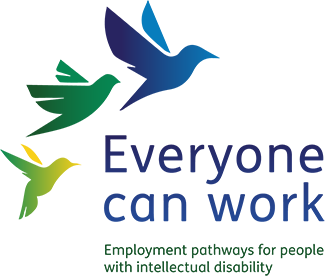What is microenterprise?
Microenterprises are a form of creating self-employment and are sometimes called small business enterprises (SBE) or micro-businesses. One definition is of businesses which employ 10 or fewer employees including the micro-entrepeneur, often rely on a very small amount of start-up costs (Conroy et al. 2010) and may or may not make enough money to support an individual (Reddington & Fitzsimons, 2013). A recent Australian study described microenterprises as:
a very small business that is simple to start, with minimal capital needed. They can have a vital purpose in improving people’s quality of life and may give PwD a role in their local community providing a service or goods. They are highly individual – able to happen at a scale, stamina and schedule that suits an individual (Darcy, Collins, Stronach, 2020, p.ii).
Microenterprises are emerging as an employment option for people with intellectual disability, including those who have high support needs. They are:
highly individualised, person-centred, and are built around the skills, strengths, and interests of the focal person. SBEs draw on a range of funding sources and paid and unpaid supports are instrumental in their development and continuation (Thoresen et al., 2018, p.161).
A microenterprise can have a range of legal structures including ‘a simple corporation of any type, offering the possibility of holding assets in the corporation, rather than in the individual’s name‘ (Conroy et al. 2010, p. 270) or can be owned and operated by a family member and then employ the individual with intellectual disability (Thoresen et al., 2018).
The benefits of self-employment for people with disability have been described as:
- including types of work not found in existing job opportunities
- offering a high degree of control and self-reliance which is attractive to some people
- offering a way to control how much personal income is drawn from a business and therefore manage the impact on government benefits and income support
- enabling the accumulation of assets (in a way not possible via income support)
- enabling control over the workplace and job tasks so that they match the needs of the individual
- offering capacity to schedule work around own needs
- potentially overcoming barriers to employment such as lack of transportation, workplace discrimination etc. (Hagner and Davies, 2002; Ouimmette and Rammler, 2017; Ashley and Graf, 2018).
Microenterprises involving people with intellectual disability have some common ingredients including:
- individualization, that is, ‘connected to genuine interests and talents of each individual’ (Hagner & Davies, 2002:73), and ‘designed around [the person]… his likes, strengths, and support needs…[and] underpinned by a clear vision for his life’ (Thoresen et al., 2018, p. 167). As described by Reddington & Fitzsimons (2013) ‘the microenterprise should be wholly built around the person who is the “boss”, with outcomes that suit that person’ (p.125).
- generating some form of income for the individual or business
- the business is genuine: ‘offering a real service that is reliable and fulfils a specific need for the clients’, even if with high levels of support from others (Thoresen et al., 2018, p. 167; Bates, 2009)
- strong leadership
- strength-based approaches
- an emphasis on social inclusion
- some degree of control by the person with intellectual disability and/or their supporters. Some examples document the role of support workers in actively working to support this (Hagner & Davies, 2002)
- often supported by individual funding arrangements, such as the NDIS
- have a range of supports in place, ‘formal [i.e. disability and business supports] and informal [i.e. family and friends] …. [which are] flexible and creative in the way they function’ (Thoresen et al., 2018, p. 167).
Microenterprises involving people with intellectual disability or those with high support needs have included a range of business focuses including:
- advocacy,
- public speaking,
- website development,
- software consultancy,
- pottery,
- artwork (McNaughton et al., 2006)
- personal services (e.g. household tasks including waiting for tradespeople)
- courier service
- making useable products from recycled paper and plastics
- production and sale of birdseed (Thoresen et al., 2018)
- gardening
- café
- car washing
- dance tuition
- administration (Reddington and Fitzsimons, 2013).
Microenterprises involving people with intellectual disability are predominantly developed by parents.
The substantial involvement of parents and other informal support in establishing and continuing SBEs [small business enterprises] exemplifies how SBE is different to self-employment. While the social and economic benefits of SBE and self-employment may be similar, the support structures vital to starting-up and continuing SBEs are distinctive (Thoresen et al., 2018, p.170).
The rate of self-employment (entrepreneurship) among people with intellectual/cognitive disability in Australia is relatively high and estimated to be only 2.5% less than non-disabled Australians, though it is the lowest rate of entrepeneurship among Australians with disability (Darcy et al., 2020). As with overseas contexts, people with disability in Australia are, on average, 43% more likely to be self-employed than Australians without disability due to a range of factors including difficulty in gaining employment and lifestyle advantages of self-employment. It should be noted though that females with disability are far less likely to be entrepeneurs than males (Darcy et al., 2020).
Microenterprises involving people with intellectual disability are not well researched. However, there is a small amount of evidence that these microenterprises can operate in Australia and have some longevity (e.g. over 8 years) (Thoresen et al., 2018).
What are the outcomes and benefits of microenterprises?
A recent Australian study of micro-entrepeneurs with disability (including 10% with intellectual disability) found that outcomes included:
- sense of purpose,
- sense of future
- contributing to the community
- increased self-esteem
- increased quality of life
- larger social network
- having a job
- creating employment for others
- having a secure income (Darcy et al., 2020).
Likewise, one study of people with intellectual disability in the United States involved in microbusinesses found that outcomes included social and economic benefits and all participants had improved worklife quality, as did their support workers involved in supporting the enterprise activity (Conroy et al., 2010). A small scale study of four people with intellectual disability in Australia found a similar range of outcomes including increased social connection and inclusion, increased sense of value, personal development, and additional income (Thoresen et al. 2018).
In a UK study of people with intellectual disability strong social outcomes were evident:
All entrepreneurs consulted had found the process very positive, gaining in confidence and ability, and engagement with the local community. Individuals spoke of being accepted as equal by others who did not have a learning disability – “The thing that we’re most proud of is the fact that we work on the market, we pay the market fee, we do exactly the same as every other trader, we have good weeks and bad weeks and everybody has to do that” (Reddington and Fitzsimons, 2013, p.129).
A study of microentrepeneurs with intellectual disability in the UK found that a sense of success was not related to making a wage from the enterprise. In the enterprises studied, some generated enough income to pay a full wage, some made some contribution to a wage, while in others people were happy to ‘volunteer’ within their own organization and not be paid a wage. ‘Typically, being busy and doing something worthwhile was perceived as more important than income’ (Reddington and Fitzsimons, 2013, p.128).
Ingredients of success
While there is not a great deal of research on what are the ingredients of success for developing and operating a microenterprise involving a person with intellectual disability, the following have been commented on in the literature:
- Provision of support: This includes support from family, friends, disability support organisations, as well as providers of business advice (Thoresen et al., 2018; Hagner and Davies, 2002; Reddington and Fitzsimons, 2013).
All individuals with learning disabilities required support to run their microenterprises. No microenterprises examined generated sufficient revenue to cover ongoing support costs, so external sources are required to meet support costs. Meeting on-going support costs was the major factor affecting sustainability (Reddington and Fitzsimons, 2013, p.130).
In an Australian study, support from family and friends was seen as ‘integral’ with ‘many of the cultural, structural and attitudinal barriers experienced by PwD are overcome with support from immediate family, friends and carers’ (Darcy et al., 2020, p. iii).
- Financial planning and support: including benefits planning and assistance in finding funding or other financial incentives (Hagner & Davies, 2002).
- Alignment of individual’s skills and interests with a genuine community need: ‘an ability to deliver a product or service needed to be based on a clear demand, either existing or created for that product or service’ (Bates, 2009, p.3).
References
Bates, K. (2009). In Business: Developing the Self Employment Option for People with Learning Disabilities. Programme Report, UK, Foundation for People with Learning Disabilities, https://eric.ed.gov/?id=ED542388
Conroy, J.; Ferris, C. & Irvine, R. (2010). Microenterprise Options for People With Intellectual and Developmental Disabilities: An Outcome Evaluation, Journal of Policy and Practice in Intellectual Disabilities Volume 7 Number 4 pp 269–277
Darcy, S.; Collins, J. & Stronach, M. (2020). Australia’s Disability Entrepreneurial Ecosystem: Experiences of People with Disability with microenterprises, self-employment and entrepreneurship, University of Technology, Sydney.
Hagner, D., & Davies, T. (2002). “Doing my own thing”: Supported self-employment for individuals with cognitive disabilities. Journal of Vocational Rehabilitation, 17(2), 65-74.
McNaughton, D., Symons, G., Light, J., & Parsons, A. (2006). “My dream was to pay taxes”: The self-employment experiences of individuals who use augmentative and alternative communication. Journal of Vocational Rehabilitation, 25(3),181-196.
Reddington, T. & Fitzsimons, J. (2013). People with learning disabilities and microenterprise, Tizard Learning Disability Review; Vol. 18, Iss. 3: 124-131
Thoresen, S. H., Thomson, A., Jackson, R., & C ocks, E. (2018). Meaningful social and economic inclusion through small business enterprise models of employment for adults with intellectual disability. Journal of Vocational Rehabilitation, 49, 161-172. doi: 10.3233/JVR-180962
The authors would like to acknowledge the usefulness of Crosbie, J.: Murfitt, K.; Hayward, S. & Wilson, E. (2019), NDIS Participant Employment Taskforce. Literature review: Employment and economic participation of people with disability, Burwood, Deakin University, as a review of similar literature that provided initial guidance.


